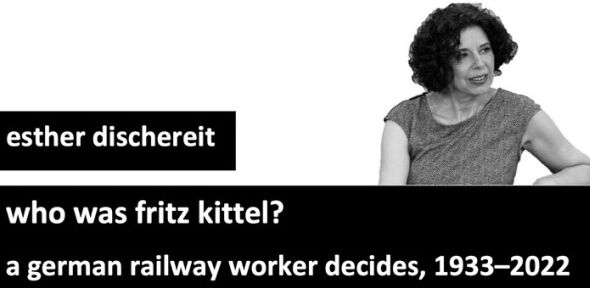
‘Who was Fritz Kittel? A German Railway Worker Decides, 1933–2022’: A Reading and Discussion with Esther Dischereit, 5.2.2024
The German Section had the honour of hosting the distinguished German writer Esther Dischereit in Cambridge on Monday 5 February 2024 for a rich and engaging presentation about her recent exhibition ‘Who was Fritz Kittel? A German Railway Worker Decides, 1933–2022’. This special event was co-organized by Jonny Ball and Doriane Zerka as the annual Lent-term collaboration between the German Graduate Research Seminar and Section Research Colloquium. The impressive turnout, which included students and staff from across the University, as well as members of the general public from Cambridge and beyond, was testament to the continued relevance and significance of Dischereit’s work.
In February 2023, Dischereit created an exhibition in cooperation with Deutsche Bahn to honour the railway worker Fritz Kittel. In 1944 and 1945, he hid her mother Hella and sister Hannelore, who as Jews were persecuted by the Gestapo and threatened with death in Germany under National Socialism. They were liberated by US troops in 1945. Dischereit began to search for the family of the rescuer and found them in 2019. Fritz Kittel had not told his own family about his courageous act throughout his life.
Dischereit's literary response in seventeen text pieces included other found objects from the lives of her mother, sister, and Fritz Kittel, and they offered a dialogue with those who are now the daughters and sons or grandchildren. What did we read when we read these documents? What did we see when we looked at these photos? False information given at a registration office, illegal names, addresses.
After reading from the seventeen text pieces together with Jonny Ball, Dischereit discussed her documentation of dead ends and red herrings in the course of her research, the possibilities of recording and interpreting lacunae in historical documents and sources (such as missing images in a family photo album), and the lack of postwar legal proceedings in Germany against the employees of the Deutsche Reichsbahn for their role in the Shoah.
Dischereit lives in Berlin, writes prose, poems, essays, and radio works. She is considered one of the most important voices of Jewish literature in Germany in the second generation after the Shoah. She was honoured with the prestigious Erich Fried Prize for her work in 2009. She was a professor at the University of Applied Arts in Vienna from 2012 to 2017, and held a chair in contemporary poetics at New York University in 2019.
Among Dischereit’s most recent publications and projects are: ‘Hab Keine Angst! Erzähl alles. Das Attentat von Halle und die Stimme der Überlebenden’ (ed., 2020); ‘Sometimes a Single Leaf’ (2020) and ‘Flowers for Otello. On the Crimes that Came out of Jena’ (2022), both translated by Ian Galbraith; as well as ‘Wer War Fritz Kittel?’ (exhibition, 2023: Berlin / Frankfurt am Main / Chemnitz / Nürnberg). Dischereit’s next major prose work, ‘Ein Haufen Dollarscheine’, is due to be published in autumn 2024.
The co-organizers would like to express special thanks once again to Sarah Colvin, Charlotte Lee, Jeanne Lefévère-Laiode, Mike Levy, Maria Roca Lizarazu, Andrew Webber, Tara Windsor, the Beth Shalom Reform Synagogue, Cambridge University German Society, the DAAD Research Hub, the German Section, the Goethe-Institut London, Jesus College, the Jesus College MCR, and the Schröder Fund for their invaluable support of this event.


